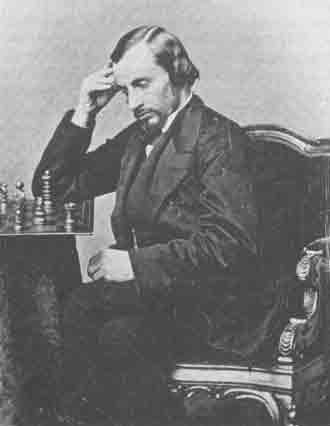|

Daniel Harrwitz
Daniel Harrwitz was born in Breslau,
Germany (which is now Wroclaw, Poland ) on April 29, 1823 - just 5
years after Herr Anderssen, another Breslau native. When he was 22, he
moved to Paris and became a regular at the Café de la Régence where he
secured a good reputation as a chess player, particularly as a blindfold
player. Then in 1846 he and Lionel Kieseritzky moved together to London.
He was able to arrange a match with Howard
Staunton, then the recognized champion of England. The terms called for 21
game, not counting draws, in three separate sections of 7 games each. The
first 7 were played at Pawn & two; the next 7 were played at
Pawn & one; and the final 7 were played on even terms. As strange as
the match term might seem, the results were even stranger. Staunton won
the first section (Pawn & two) 4-3; Harrwitz won the second section
(Pawn & one) 6-1; and Staunton won the final (even) section 7-0.
Clearly, Staunton was the superior player
at this time, but Staunton was at the height of his career while Harrwitz
was really just beginning his.
In 1848 Harrwitz returned the Breslau for
a visit. He played a relatively unknown chess problemist named Adolf
Anderssen. The match called for the best out of eleven but when it reached
5 -5, they mutually agreed to end it.
Since Anderssen was invited to the London
1851 tournament partly based on his draw with Harrwitz, it seems evident
that Harrwitz was generally considered a very strong player at this time,
despite his loss to Staunton. Harrwitz , for some reason, didn't play in
that tournament. It may have been the because the tournament was sponsored
by the St. George Chess Club, Howard Staunton's club, that club rivalry
influenced Harrwitz's decision not to participate.
But the next year, 1852, Harrwitz played
two matches against one of the strongest London players, Elijah Williams.
The terms of both matches dictated the winner would be the first to score
7 wins and in the second match it required that every game had to begin
with 1.e4. Held at the London Chess Club, the club offered a prize of
which three-fourths went to the winner and one-fourth went to the loser.
Harrwitz beat Williams 7-0 in the first match. The second match spanned
1852-53 and Harrwitz won that one 7-2. It was during the second match that
Harrwitz took a job as editor of the British Chess Review.
1853 proved to be an interesting year for
Harrwitz. Johann Löwenthal challenged him to a match. But part of
Löwenthal's terms for the match sought the games to be public property.
Harrwitz wouldn't agree to those terms and the negotiations ceased. Then
Harrwitz challenged Staunton to a match. Staunton declined the offer in
such a way as to publicly humiliate Harrwitz. This started a war of sorts
in their respective chess columns. Meanwhile Löwenthal, who also received
some scars from Harrwitz's pen, came to terms with Harrwitz and
their match commenced. The match with Löwenthal featured one of the
greatest come-backs in chess history. The match terms declared the winner
as the first side to win 11 games, draws not counting and that the moves
were to be timed, allowing a maximum of 20 minutes per move - either
player exceeding the 20 minutes would be fined 10 shillings for each 10
minute block.. Löwenthal lost the first 2, but after 9 conclusive games,
the score stood 7-2 in Löwenthal's favor. Harrwitz took off for Brighton
for a few days, citing poor health, but forfeited two more games in doing
so. Now the score stood at 9-2 in favor of Löwenthal. The rest must have
done Harrwitz a world of good since, after he returned, in the 19 games
that followed, Harrwitz scored 9 wins to Löwenthal's 1, winning the match
11-10. Also in 1853 Harrwitz beat Joséf Szén in a small match 3-1-1.
Staunton continued to refuse to play Harrwitz, but in all likelihood,
Harrwitz was London's strongest player.
In 1856 Harrwitz moved to Paris and
settled in as the club professional at the Café de la Régence. He beat
Jules Arnous De Rivičre in a match 5-2. Then came Morphy who seemed to
have been Harrwitz's bad luck charm. After losing to Morphy, during which
match Morphy gave his blindfold exhibition at the Café de la Régence,
Harrwitz, also a noted blindfold player, attempted his own blindfold
simul. His opponents were either very weak or the games were rigged and
the entire affair was an utter failure.
In 1860, he lost a match to Ignaz Kolisch.
His treatment of Morphy eventually cost
Harrwitz his place at the Café de la Régence.
Harrwitz retired to Bozen, Tyrol, in the
Austrian Alps, living off his inheritance until he died in 1884.
G. A.
MacDonnell's characterization of Harrwitz
Frederick Edge's
impression of Harrwitz
Harrwitz vs.
Anderssen, Breslau 1848
|

